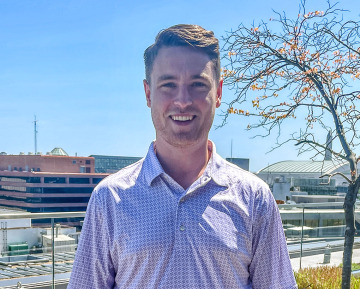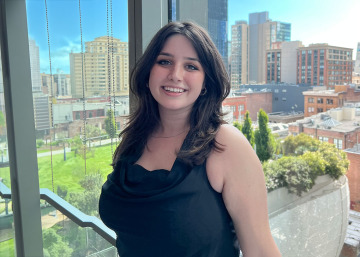The Art of Storytelling: How Two Recent iSchool Alumni Launched Rewarding Careers in Information Science

Though job growth in the information sector is increasing rapidly, finding the right career fit takes planning, networking and persistence. It also takes storytelling.
“I got so much value out of hearing personal career stories from guest speakers who held leadership roles in such companies as Meta, Snapchat and Twitter,” says Addison Cryblskey, speaking of lecturer Jay Sampson’s Digital Media History and Innovations course, which he took before graduating in 2022 from the University of Arizona with his Bachelor of Science in Information Science and Technology (BSIST, now BS in Information Science). “Learning how these executives were able to succeed in the industry, climb the ladder and get to one of those top dream-level jobs was inspiring.”
For Sage Pezzulo, who graduated from UArizona in 2023 with a BSIST, storytelling is a skill she learned and uses now in her career as a technology analyst for a multinational consulting firm. “The iSchool’s Human Computer Interaction course prepared me for my career in so many ways,” she says. “By helping us understand usability, it set a foundation for storytelling relating to technology, which is a huge skill to have—and one I’ve used regularly in my new career.”
The narratives of these recent School of Information graduates showcase their early career success—each of their stories rich with the nuances of preparation, adaptation and the indispensable value of forging strong relationships. This spring, they shared insights and other stories from their careers in Sampson’s course.
“Making the transition from college to career is challenging, even for the most accomplished students,” says Sampson. “That's why I prioritize opportunities to highlight recent iSchool alumni who’ve built on the education at UArizona and found rewarding employment. In the case of both Sage and Addison, I was thrilled to have them back on campus and sharing their thoughts on how they prioritize ongoing education and skill enhancement in the professional world.”
The alums’ paths, distinct yet parallel, demonstrate not only the importance of academic rigor but also the power of experiential learning in shaping a successful post-graduation journey.
A Foundation in Curriculum and Collegiate Work Experience
At the heart of Cryblskey and Pezzulo's stories is the critical role of coursework in laying the groundwork for their careers. But it wasn’t just the dynamic iSchool curriculum that prepared them to excel in their jobs following graduation. Both students supplemented their iSchool coursework with part-time jobs and internships that further honed their skills.

Addison Cryblskey outside his office in Washington, D.C.
“In my final year, I took on a part-time role as a data assistant with Repair the World, supporting their data team while gaining crucial professional experience,” says Cryblskey, who is now a data analyst with Ankura Consulting. At his office in Washington, D.C., he contributes to projects and client presentations and also leverages Python, SAS and Excel for data analysis, collection, cleaning and forecasting.
During school he also worked for the University of Arizona Foundation, reaching out to alumni and parents for donations to the university—“a position that not only sharpened my communication skills but also instilled effective sales techniques and relationship building,” he notes—and, the summer before graduation, he held a sales-focused job in Alaska.
If not for Pezzulo’s desire to experience life outside of the Sonoran Desert, she may have accepted an offer for a career position from Arizona Public Service in Phoenix, where she worked remotely her sophomore and junior years. “Working at APS was great because everyone was so nice, and willing to help,” she says. “I also gained valuable experience because I was able to collaborate with over 50 business leaders to align all of the business services in APS’s ServiceNow initiative.”
Pezzulo built on that experience—as well as internships at University Libraries and her current company—to land the multifaceted job in Seattle she has today. Though her team is fully remote, she goes into the office every week or two. Part of a two-year rotational development program, she recently transitioned out of a role where she was conducting user acceptance testing—“very detail-oriented work where I learned a lot,” she says—to a “more creative role with a larger emphasis on communication” in the office of the chief information officer. “It’s really interesting,” she says. “I am supporting initiatives within the firm and get a unique view into technology strategy.”
Opportunities Missed, Lessons Learned
Even with their academic and professional experience, both alumni look back at missed opportunities as students at UArizona that would have further prepared them for their fast-paced, data-driven work environments. For Cryblskey, it was focusing more closely on his statistics course. “I didn’t recognize the full value of the tools we were learning,” he says. “I use those tools every day now, but I wish I paid more attention to the minute details of statistics, because it really does give you a key to looking at data in a different way and finding answers within huge sets of numbers.”
Pezzulo has few regrets of her time at UArizona, but one of them is not taking full advantage of the career resources available from the university, including resume review. “Even if you have the best resume in the world, it may not get past the automated resume scanners firms use now,” she says. “It’s vital for students, particularly those who haven’t applied for jobs before, to know what works and what doesn’t—and resources at UArizona can help. Invest that time in yourself and your future.”
The Power of Building and Nourishing Relationships
Whether on campus or off, both alumni recognize the power of relationship building. For example, Cryblskey had three job offers upon graduation—and all three were thanks in part to networking during his time as a student. Whether it was accessing his fraternity’s extensive network of professionals or making connections through student organizations, he recommends expanding networks while still in school. “When you’re in a group with likeminded peers, you are willing to work harder to succeed,” he says. “Just being around that group gives you more motivation, pushing you to step outside of your comfort zone.”

Sage Pezzulo near her office in Seattle, Washington.
Though Pezzulo landed her job thanks to an internship, she moved to a new city to start that job, making networking even more important. “One of the realizations I had leaving Tucson is that if you are physically in a place with more opportunities, it’s easier to find those opportunities. Don’t be afraid of moving. I feel like there are a lot more opportunities now that I’ve relocated.”
As a fully remote employee, relationship building is particularly important for Pezzulo. She bolsters her personal and professional network in many ways, and that starts by being proactive in maintaining new relationships. With friends all over the country, one way she’s kept in touch is through one of her passions—cooking. “My friends and I have started a cookbook club,” she says. “We all Zoom in, choosing a recipe, cooking together and then dining together, virtually.”
Professionally, she acknowledges that relationship-building is more challenging and different from meeting in person around the water cooler. “You have to be a lot more purposeful about having conversations and trying to get to know people,” she says. “If you only talk business, you won’t have a strong relationship. So one of my primary focuses since starting this job is relationship-building—and that has put me in a great position with my career.”
For instance, she hosts virtual coffee chats, and not just for people she already knows. “Any time I’m in a meeting with someone who’s really interesting, or who I know I can learn from, I’ll invite them to a coffee chat. People love talking about their interests and about their career progression, and as a curious person, I love to listen.”
Though Cryblskey’s work is primarily in person, relationship-building has been essential for his career, as well. “There’s a great range of people here, from senior managers who I can gain valuable knowledge from to associates like me—and we’ve formed a great friend group.”
His company has also supported him in “flexing my creative muscle” as he builds comradery among his team, he says. For instance, he recently started an onsite chess league, with tournaments twice per year. The league not only serves as a creative outlet but also as a means to strengthen bonds with colleagues, enhancing sense of community within the workplace.
A Blueprint for Success
The stories of Addison Cryblskey and Sage Pezzulo offer a blueprint for success for students at the iSchool. Their experiences illuminate the multifaceted nature of career preparation, underscoring the importance of engaging coursework, practical experience and, perhaps most critically, the relationships that shape their paths forward.
For students standing on the precipice of graduation, Cryblskey and Pezzulo’s journeys serve as a reminder that success is not merely a product of individual effort but a tapestry woven from the threads of knowledge, experience and community. In their stories, the message is clear: embrace every learning opportunity, seek out experiences that challenge and grow you, and never underestimate the power of building and nurturing relationships along the way.
Learn more about the data-driven undergraduate programs of the School of Information, or explore ways to support iSchool students through scholarships and other initiatives.

